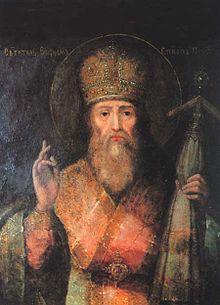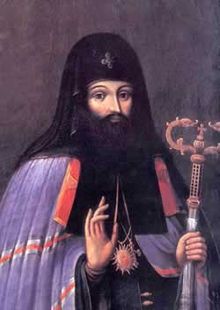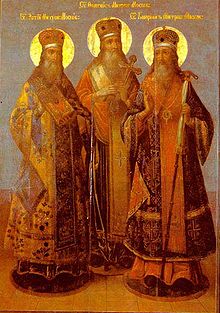- List of Patriarchs and Metropolitans of Ukraine
-
This is a List of Metropolitans and Patriarchs of Ukraine related to the History of Christianity in Ukraine, ordered according to the jurisdictions.
Contents
Ecumenical Patriarchate
Metropolitans of Kiev and all Rus' (988–1458)
First Kievan period (988–1299)
 Metropolitan Ephraim of Pereyaslavl
Metropolitan Ephraim of Pereyaslavl
- Michael I, 988(?)–992(?)
- Leontius, 988(?)–1004(?) [1]
- John, 1008(?)–1017(?) [2]
- Teopempt 1037(?)–1043(?) [2]
- Hilarion Rusyn 1051–(?) [3]
- Ephraim, 1055(?)–(?) [4]
- Jurij, 1072(?)–(?) [4]
- John Prodrom, 1077(?)–1089 [5]
- John, 1090–1091 [5]
- Ephraim of Pereyaslavl, 1091–1097
- Nicholas, 1097–1101(?) [6]
- Nikephoros, 1104–1121 [6]
- Nikita, 1122–1126 [7]
- Michael, 1130(?)–1145(?) [7]
- Kliment Smoliatich, 1147–1159
- Kostantyn, 1156–1159 [8]
- Teodor, 1161–1163 [8]
- John, 1164–1166 [8]
- Costantine, 1167–1177(?) [9]
- John (?)–(?) [9]
- Nikephoros, 1182(?)–1197(?) [9]
- Matthew, 1210(?)–1220 [10]
- Сyril, 1224–1233 [10]
- Joseph, 1237–(?) [10]
- Peter Akerovich, 1244–1246
- Cyril, 1250–1281 [11]
- Maximus, 1283–1299
In 1299 Metropolitan Maximus moves the seat from Kiev to Vladimir, title "of Kiev" retained.
Vladimir period (1299–1325)
In 1325 the seat is moved to Moscow
Moscow period (1325–1461)
- Theognostus, 1328–1353
- Teodorite (anti-Metropolitan), 1352 [12]
- Alexius, 1354–1378
- Roman (anti-Metropolitan), 1354–1362 [13]
- Cyprian, 1376–1406 [14]
- Dionysius I (anti-Metropolitan), 1384–1385
- Pimen (anti-Metropolitan), 1382–1389
- Photius, 1410–1431
- Gregory Camblak (anti-Metropolitan), 1415–1419 [15]
- Gerasimus, 1433–1435 [16]
- Isidore of Kiev, 1436–1441
- vacant, 1441–1448
- Jonah, Metropolitan of Moscow, 1448–1461
In 1461, following the fall of Constantinople, and the rise of Grand Duchy of Moscow, the Russian Orthodox Church gains full autocephalocy, the title "of Kiev" is dropped. Rus' land that is part of the Grand Duchy of Lithuania, including Kiev, remain part of Ecumenical Patriarchate, with the seat in Vilno (Vilnius)
Metropolitans of Kyiv, Galicia and all Rus'
Vilno period (1458–1595)
 Metropolitan of Kiev, Halych and All–Rus' Peter Mogila
Metropolitan of Kiev, Halych and All–Rus' Peter Mogila
- Gregory II Bulgarian, 1458–1473
- Misail Drutsky, 1476–1480 [17]
- Spyridon Satana (anti-Metropolitan), 1476–1482 [18]
- Symeon, 1481–1488 [18]
- Jonah Hlezna, 1489–1494 [19]
- Macarius Chort, 1495–1497 [19]
- Joseph Bolharynovich, 1499–1501 [19]
- Jonah, 1503–1507 [20]
- Joseph Soltan, 1509–1522 [20]
- Joseph, 1523–1533 [20]
- Macarius, 1534–1555 [21]
- Sylvester Bilkevich, 1556–1567 [21]
- Jonah Protasevich, 1568–1577 [21]
- Elias Kucha, 1577–1579 [22]
- Onesiphorus Devochka, 1579–1589 [22]
- Michael Rogoza, 1589–1599
In 1595 the Vilno/Kiev Metropolia signs the Union of Brest with the Catholic Church, so establishing the Ukrainian Greek Catholic Church. For the following list of Primates, see section List of Greek Catholic Primates.
Second Kyiv Period (1620–1686)
A few years after the Union of Brest, in 1620 the Ecumenical Patriarchate re-established the Kyivan Metropolia with the title of "Metropolitans of Kyiv, Galicia and all Rus"
- Yov Boretsky, 1620–1631
- Isaia Kopynsky, 1631–1633
- Peter Mogila, 1633–1646
- Sylvester Kossov, 1647–1657
In 1686, following the Pereyaslav Rada, the Kievan Metropolia, is transferred from the Ecumenical Patriarchate, to the Moscow Patriarchate
Russian Orthodox Church
Metropolitans of Kiev, Galicia and of All Little Rus' (1685–1770)
- Gedeon Svyatopolk-Chetvertinskym, 1685–1690 [28] (Former bishop of Lutsk. Chetvertinsky was elected by the sobor initiated by the Hetman Ivan Samoilovych and later went for consecration to Moscow instead of Istanbul)
- Barlaam Yasynsky (also spelled as Varlaam Yasinsky), 1690–1707 [28]
- Ioasaph Krakovsky, 1708–1718 [28]
- Barlaam Vanatovich, 1722–1730 [28]
- Raphael Zaborovsky, 1731–1747
- Timothy Shcherbatsky, 1748–1757 [28]
- Arsenius Mohylyansky, 1757–1770 [28]
Metropolitans and Archbishops of Kiev and Galicia (1770–1990)
 Metropolitan Vladimir Bogoyavlensky
Metropolitan Vladimir Bogoyavlensky
- Gabriel Kremenetsky, 1770–1783 [29]
- Samuel Mstislavsky, 1783–1796 [29]
- Hierotheus Malytsky, 1796–1799 [29]
- Gabriel Banulesko-Bodoni, 1799–1803 [29]
- Serapion Alexandrovsky, 1803–1822 [29]
- Eugene Bolkhovitinov, 1822–1837 [29]
- Philaret Amphiteatrov, 1837–1857 [30]
- Isidore Nikolsky, 1858–1860 [30]
- Arsenius Moskvin, 1860–1876 [30]
- Philotheus Uspensky, 1876–1882 [30]
- Platon Gorodetsky, 1882–1891 [30]
- Joanicius Rudnev, 1891–1900 [30]
- Theognostus Lebedev, 1900–1903 [30]
- Flavian Gorodetsky, 1903–1915 [31]
- Vladimir Bogoyavlensky, 1915–1918
- Antony Khrapovitsky, 1918–1919
- Nazarius Blinov, 1919–1921 [31]
- Michael Yermakov, 1921–1925 [31]
- Georges Deliev, 1923–1928 [31]
- Macarius Karamzin, 1924 [31]
- Sergius Kuminsky, 1925–1930 [31]
- Demetrius Verbitsky, 1930–1932 [31]
- Sergius Grishin, 1932–1934 [32]
- Constantine Dyakov, 1934–1937 [32]
- Alexander Petrovsky, 1937–1938 [32]
- Nicholas Yarushevich, 1941–1944 [32]
- Panteleimon Rudik, 1941–1943 [32]
- John Sokolov, 1944–1964 [32]
- Ioasaph Leliukhin, 1964–1966 [32]
- Philaret Denisenko, 1966–1990
In 1990 the Ukrainian Exarchate of the Russian Orthodox Church, is given full autonomy status forming the Ukrainian Orthodox Church (Moscow Patriarchate)
Metropolitans of Kiev and All Ukraine
- Philaret Denisenko, 1990–1992 (excommunicated by the Moscow Partiarchate in 1997)
- Volodymyr Sabodan, 1992–present
Ukrainian Autocephalous Orthodox Church
Metropolitan of Kyiv and All Ukraine (1921–1936)
- Vasyl Lypkivsky, 1921–1927
- Mykola Boretsky, 1927–1930 [33]
- Ivan Pavlovsky, 1930–1936 [33]
Due to Soviet pressure, the UAOC is liquidated in 1936.
UAOC during World War II (1942–1944)
In 1942, Orthodox Ukrainians enjoyed somewhat increased freedom under Nazi Germans who allowed to re-establish the Church on its occupied territory.
- Polikarp Sikorsky, (Administrator of the Church under the title of Metropolitan of Lutsk and Kovel), 1942–1944 [34]
This relative freedom lasted till the return of the Red Army in 1944, after that the UAOC was again liquidated and remained structured only in the diaspora. In 1944 the Orthodox Metropolitan of Warsaw, Dionizy Waledynski, was appointed "Patriarch of All Ukraine", but the Soviet Union did not allowed any operation in Ukraine.
Patriarchs of Kiev and all Rus-Ukraine from 1990
In 1990 the Ukrainian Autocephalous Orthodox Church is re–instated in Ukraine, and the former Ukrainian Orthodox Church of Canada Metropolitan Mstyslav is bethroned as a Patriarch.
- Stepan Mstyslav, 1990–1993
- Dmytro Yarema, 1993–2000
Metropolitans of Kiev and All Ukraine
- Mefodiy Kudriakov, 2000–incumbent
Ukrainian Orthodox Church - Kiev Patriarchate
Patriarchs of Kiev and All Rus-Ukraine
In 1992 the Ukrainian Orthodox Metropolitan Filaret, after an agreed step down from his throne at a synod in Moscow, upon his return to Kiev announces a split from the Russian Orthodox Church, and a union with the Ukrainian Autocephalous patriarchate, creating a new Ukrainian Orthodox Church–Kiev Patriarchate.
- Patriarch Mstyslav, 1992–1993
Following the death of Patriarch Mstyslav in 1993, the temporary union ends, and the UOC–KP and UAOC is split.
Ukrainian Greek Catholic Church
Following the Union of Brest the Metropolia of Kiev-Halych and all Rus broke relations with the Patriarch of Constantinople and place themselves under the Pope of Rome, thus establishing what later was known as "Ukrainian Greek Catholic Church". The residence of the Metropolitan had to be moved in early 17th century to Navahrudak and later to Vilnius. At first widely successful, within several decades it had lost much of its initial support, mainly due to Imperial Russian persecution, though in Galicia the church fared well and remains strong to this day.
Primates from 1596 to 1807
Metropolitans of Kiev:
- Mykhajlo Rohoza, 1589—1599
- Ipatii Potii, 1600—1613
- Josyf Veliamyn Rutsky, 1613—1637
- Rafajil Korsak, 1637—1640
- Antin Sielava, 1641—1655
- Havryil Kolenda, 1666—1674
- Kyprian Zochovskyj, 1674—1693
- Lev Szlubic-Zalenskyj, 1694—1708
- Yurij Vynnyckyj, 1708—1713
- Lev Luka Kiszka, 1714—1729
- Atanasy Sheptycky, 1729—1746 [35]
- Florian Hrebnicky, 1748—1762 [35]
- Feliks Filipp Volodkovich, 1762—1778 [35]
- Ludovik Lev Sheptytsky, 1778—1779 [35]
- Yason Smogorzhevsky, 1780—1786 [35]
- Teodor Rostotsky, 1787—1805 [35]
Primates from 1807 to 2005
In 1807 the Ukrainian Greek Catholic Church was split in order to separate the territories under the Russian Empire (Metropolia of Kiev) from the ones under the Habsburg Monarchy, thus elevating the Eparchy of Lviv to the rank of Metropolis and granting it the same rights of the Metropolis of Kiev.
Metropolitans of Kiev from 1807 to 1838:
Following the Synod of Polatsk (1838) the Greek Catholic church was forcedly abolished on the territory of the Russian Empire, and its property and clergy transferred to the Russian Orthodox Church.
Metropolitans of Lviv from 1807 to 2005:
 Metropolitan Andrey Sheptytsky
Metropolitan Andrey Sheptytsky
- Antin Angelovych, 1808—1814
- Mykhajlo Levitsky, 1816—1858
- Hryhory Yakhymovych, 1859—1866
- Spyrydon Lytvynovych, 1866—1869
- Joseph Sembratovych, 1870—1882
- Sylvester Sembratovych, 1882—1898
- Julian Sas-Kuilovsky, 1899–1900
- Andrey Sheptytsky, 1900—1944
- Josyf Slipyj, 1944–1984. In 1969 the Metropolian of Lviv was elevated to the rank of Major archbishop.
- Myroslav Ivan Lubachivsky, 1984–2000
- Lubomyr Husar, 2000–2005
Primates from 2005
In 2005 the two separated Metropolias of Kiev and Lviv have been re-united as before 1807.
Major Archbishop of Kiev–Galicia:
- Lubomyr Husar, 2005—2011
- Sviatoslav Shevchuk, 2011—incumbent
Other Autocephalous Churches
Ukrainian Autonomous Orthodox Church 1941–1944
Ukrainian Orthodox Greek Catholic Church since 2009
- Patriarch Elijah, 2011—incumbent
See also
- List of Metropolitans of Kiev
- List of Major Archbishops of Kiev–Galicia
- History of Christianity in Ukraine
Notes
- ^ Blazejowsky 1990, p. 64.
- ^ a b Blazejowsky 1990, p. 65.
- ^ Blazejowsky 1990, p. 66.
- ^ a b Blazejowsky 1990, p. 77.
- ^ a b Blazejowsky 1990, p. 78.
- ^ a b Blazejowsky 1990, p. 79.
- ^ a b Blazejowsky 1990, p. 80.
- ^ a b c Blazejowsky 1990, p. 81.
- ^ a b c Blazejowsky 1990, p. 82.
- ^ a b c Blazejowsky 1990, p. 83.
- ^ Blazejowsky 1990, p. 84.
- ^ Blazejowsky 1990, p. 86.
- ^ Blazejowsky 1990, p. 87.
- ^ Blazejowsky 1990, pp. 88–90.
- ^ Blazejowsky 1990, p. 90.
- ^ Blazejowsky 1990, p. 91.
- ^ Blazejowsky 1990, p. 179.
- ^ a b Blazejowsky 1990, p. 180.
- ^ a b c Blazejowsky 1990, p. 181.
- ^ a b c Blazejowsky 1990, p. 182.
- ^ a b c Blazejowsky 1990, p. 183.
- ^ a b Blazejowsky 1990, p. 184.
- ^ a b Senyk 1996, pp. 354–357.
- ^ Blazejowsky 1990, p. 223.
- ^ Blazejowsky 1990, p. 225.
- ^ Blazejowsky 1990, p. 226.
- ^ a b c Blazejowsky 1990, p. 224.
- ^ a b c d e f UOC-MP 2011
- ^ a b c d e f UOC-MP 2011
- ^ a b c d e f g UOC-MP 2011
- ^ a b c d e f g UOC-MP 2011
- ^ a b c d e f g UOC-MP 2011
- ^ a b Blazejowsky 1990, p. 428.
- ^ a b Magocsi 1996, p. 628.
- ^ a b c d e f Pelesz 1881, p. 1084
- ^ a b c Pelesz 1881, p. 1084
- ^ Blazejowsky 1990, p. 405.
References
- This article incorporates text from List of Metropolitans of Kiev at OrthodoxWiki which is licensed under the CC-BY-SA and GFDL.
- Pelesz, Julian (1881). Geschichte der Union der ruthenischen Kirche mit Rom. Woerl. http://www.google.com/books?id=29UCAAAAQAAJ.
- Senyk, Sophia (1996). "The Ukrainian Church in the seventeenth century". Analecta Ordinis s. Basilii Magni (Rome: sumptibus PP. Basilianorum) (Sectio II, vol XV (XXI), Fasc 1–4).
- Blazejowsky, Dmytro (1990). Hierarchy of the Kyivan Church (861–1990). Sacrum Ucrainae Millenium, 3. Rome.
- "Metropolitans of Kyiv". orthodox.org.ua. Ukrainian Orthodox Church (Moscow Patriarchate). http://orthodox.org.ua/eng/node/3. Retrieved May 18, 2011.
- Magocsi, Paul (1996). A history of Ukraine. Toronto Buffalo: University of Toronto Press. ISBN 9780802078209.
External Links
Categories:- Christianity in Ukraine
- Lists of patriarchs
- Metropolitans and Patriarchs of Ukraine
- Christianity in Europe
- Ukrainian Orthodox bishops
- Ukrainian Orthodox primates
- Lists of Eastern Orthodox Christians
- Lists of Ukrainian people
- Ukraine-related lists
Wikimedia Foundation. 2010.


